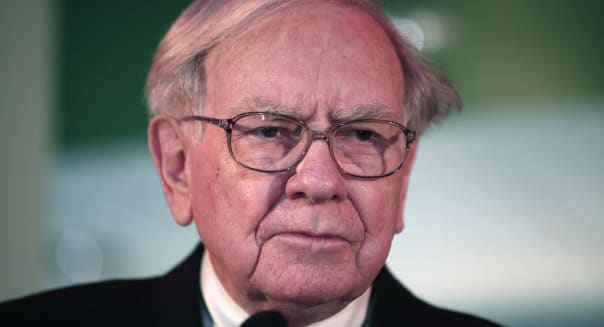America Still the ‘Mother Lode of Opportunity,’ Says Buffett
Filed under: Public Utilities, Stocks, Warren Buffett, Economy, Investing

Warren Buffett has assured shareholders of his Berkshire Hathaway (BRK-A) that he has plenty of ways to deploy cash after posting record earnings in 2013.
In his annual letter, Buffett highlighted how Berkshire’s energy unit will seek another takeover after a $5.6 billion acquisition, and he explained why a $12.3 billion investment to help take HJ Heinz private was a template for future deals. The Berkshire chairman and chief executive officer also discussed subsidiaries’ appetite to spend billions of dollars on smaller transactions, as well as equipment and plants. “Though we invest abroad as well, the mother lode of opportunity resides in America,” Buffett wrote in the letter posted March 1, referring to his company’s capital spending, which climbed to a record $11.1 billion last year.
Berkshire’s ability to deploy the gusher of cash produced by dozens of subsidiaries is a top concern for Buffett, 83, almost five decades after he took control of the company. His stock picks and acquisitions created a business that generates more than $1 billion of profit a month. The firm, based in Omaha, Neb., doesn’t pay a dividend and seldom buys back its own stock, which means Buffett and his deputies need to find other uses for the capital.
‘Enormous’ Potential of Energy Businesses
One area where Berkshire can invest is through its MidAmerican Energy unit. Buffett acquired most of the business in 2000. Since then, it has bought gas pipelines and U.S. utilities and committed billions of dollars to wind- and solar-power projects. In 2013, MidAmerican bought NV Energy, the largest electricity provider in Nevada. “NV Energy will not be MidAmerican’s last major acquisition,” Buffett said.
Focusing on energy investment makes sense, given how much cash Berkshire produces, said James Armstrong, president of Henry H. Armstrong Associates, which oversees about $500 million including Berkshire shares. “The problem Berkshire faces in the next 20 years is intelligent capital allocation of all that cash coming in,” he said. “That’s why they’ve turned toward energy. It’s enormous. It’s also stable, recurring, irreplaceable. It has some monopoly characteristics. It’s got a lot of things you would want if your vault was bursting with cash.”
Another way Buffett said he could get funds out the door is by completing deals similar to his investment in Heinz. In that transaction, Berkshire provided financing while Jorge Paulo Lemann’s 3G Capital took charge of operations. Each owns half the equity. Buffett typically takes majority control and leaves management in place.
Since 3G’s team took the reins at Heinz in June, the ketchup maker cut jobs, announced plant closings, grounded corporate jets and implemented policies to limit spending at the office. Buffett sought to allay shareholder concerns that the buyout resembled a private-equity deal, a type of transaction that he has criticized in the past for being too focused on short-term outcomes. “There is a crucial difference: Berkshire never intends to sell a share of the company,” he wrote in the letter. “What we would like, rather, is to buy more.”
Such collaboration may allow Buffett to pursue more deals said David Rolfe, chief investment officer of Berkshire investor Wedgewood Partners, which manages about $7 billion. There’s also a benefit to having a partner that’s willing to make cuts, he said. 3G is “doing the dirty work, in terms of efficiencies,” Rolfe said. That allows Buffett to be a “financing guy who’s going to be a benevolent owner in the out years.”
A Sure Bet on America’s Continued Prosperity
The CEO again highlighted deals by managers of other Berkshire subsidiaries. Together, the group agreed to $3.1 billion in acquisitions last year. Buffett has said such transactions, including the Marmon unit’s $1.1 billion deal to buy a beverage-dispenser business, are among his favorites because they don’t occupy much of his attention.
He also pointed out capital spending by Berkshire’s units. In the last 15 years, Buffett bought a number of companies that require large outlays on plant and equipment. The biggest among them is railroad Burlington Northern Santa Fe, which Buffett acquired in 2010 in what he called an “all-in wager” on the U.S. economy.
Climbing earnings at BNSF helped annual profit at Berkshire rise 31 percent to a record $19.5 billion last year. Buffett’s cash hoard ended 2013 at $48.2 billion. The U.S. will continue to create long-term investment opportunities like the railroad, a business that will play a major part in commerce a century from now, Buffett wrote in the letter.
“I have always considered a ‘bet’ on ever-rising U.S. prosperity to be very close to a sure thing,” Buffett said. “Indeed, who has ever benefited during the past 237 years by betting against America?”
Buffett also told shareholders what to expect from the company’s annual meeting on May 3. The event usually attracts tens of thousands of attendees to Omaha and showcases products from subsidiaries like See’s Candies and Brooks, which makes running shoes.
The meeting’s question-and-answer session with Buffett and Vice Chairman Charles Munger, 90, will again include a panel of analysts. Jay Gelb of Barclays will ask about insurance, joining Ruane Cunniff & Goldfarb’s Jonathan Brandt, who will cover other industries. Buffett is seeking to fill out the group with an investor who is betting on a decline in Berkshire shares, a role filled last year by Doug Kass. Three journalists are returning for a separate panel.
Permalink | Email this | Linking Blogs | Comments
http://www.dailyfinance.com/2014/03/03/warren-buffett-bullish-us-outlook/
